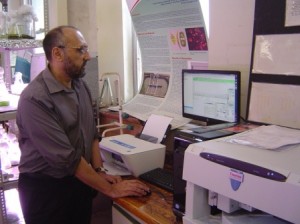The Durban University of Technology’s Institute for Water and Wastewater Technology recently secured funding to the tune of R1,272.000.00 from the National Research Foundation’s (NRF’s) National Equipment Programme (NEP) for 2015 for upgrading its high-end equipment for analysing organics in wastewater.
The money received is for the National Equipment Programme, which is an annual funding grant where applicants from all universities around South African can apply. The applicants are then reviewed by a panel of experts through a stringent and competitive process before it is given to the applicant who complies with all the relevant regulations and highest ethical and safety standards.
The equipment needed is called a Gas Chromatography Mass Spectroscopy (GCMS), a new, highly sensitive extractor ion source for higher signal-to-noise ratio (SNR) which lowers the detection limit of the instrument. It delivers value in many ways such as expanded analytical capabilities, reduced maintenance and decreased cost for energy and gases.
The Director of the University’s Institute for Water and Wastewater Technology, Prof Faizal Bux said the equipment bought with the funding will serve various researchers and postgraduate students within the University, other universities, industry and NGOs regionally. The equipment will also add a lot of value and further enhance research capacity at DUT.
Prof Bux added that the institute had, over a period of 20 years, developed a good reputation for servicing the water sector such as uMngeni Water and the eThekwini Municipality. Prof Bux said his unit was also known as a centre of excellence in the fields of microbial contribution to wastewater treatment processes and algal biotechnology. “Having access to the equipment will allow us to strengthen our relationship with our national partners such as CSIR BioSciences, University of Cape Town-Chemical Engineering, UKZN PRG and Dept of Biochemistry, Tshwane University of Technology-Water Care and produce meaningful (research) output including publications in high impact journals and presenting our findings at reputable international and national conferences. This will substantially increase our competitive edge internationally. Having access to state-of-the-art equipment allows us to make a meaningful contribution to the body of knowledge and capacitate students to function optimally,” said Prof Bux. He also said having access to the GCMS will provide a complete mapping of different complex environmental samples such as domestic and industrial wastewater as well as various biological matrices.
“We have been using these pieces of equipment which is housed in the laboratories of our research partners at UKZN. However, due to the increased number of users (undergraduates, postgraduates and postdoctoral researchers), access to the equipment for the extended periods of time required due to our needs is a major setback when keeping up to the respective timeframes. Having direct accessibility to the proposed equipment will therefore have a greater impact on our current and proposed projects and will allow us to continue publishing in high impact factor journals and presenting our findings at reputable international and national conferences.
Prof Bux has more than 20 years service at higher education institutes and has received numerous awards from external agencies including the University Top Senior Researcher Awards. Prof Bux has been awarded three bilateral grants by the NRF: a bilateral project with the Department of Energy Resources and Environmental Engineering, Egypt-Japan University of Science and Technology (EJUST) on bio hydrogen production from organic wastes, Presidency College, University of Madras, India for microalgae chloroplast genome project; University of Ouargla, Algeria on Determining the suitability of using wastewater as a substrate for algal propagation. Prof Bux has also been awarded the prestigious India-Brazil-South Africa trilateral on Evaluation and optimisation of biodiesel production from microalgae. He is ranked as the most published researchers at Durban University of Technology.
– Waheeda Peters
Pictured: Prof Faizal Bux with Doctoral student Poonam Singh at his lab. Also pictured is Prof Bux hard at work at his lab at the Institute for Water and Wastewater Technology.



